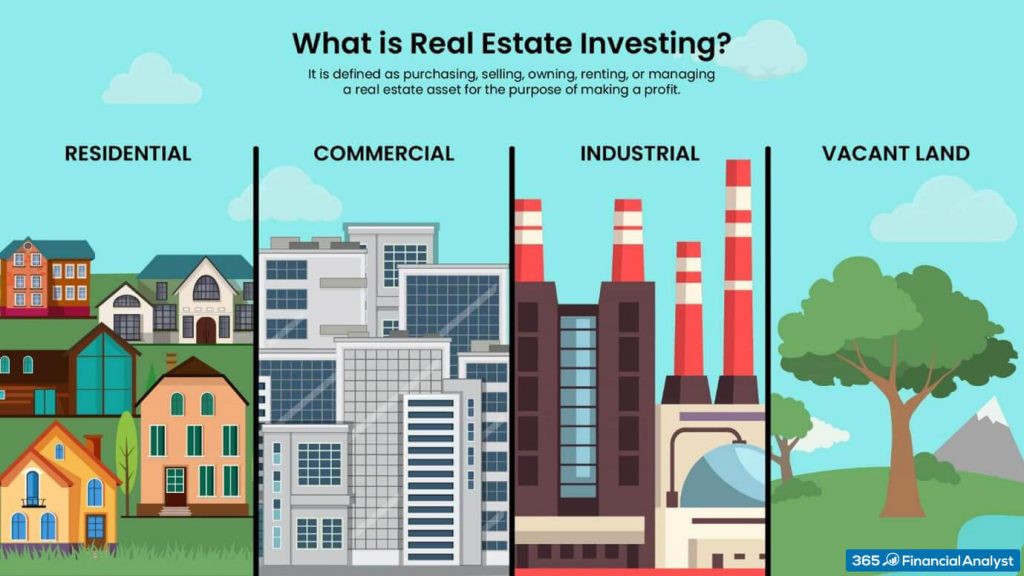What is Real Estate Investing?
Dealing with real estate investing requires a certain level of risk-taking, to the extent to which the risks involved can be used to one’s advantage.
Join over 2 million professionals who advanced their finance careers with 365. Learn from instructors who have worked at Morgan Stanley, HSBC, PwC, and Coca-Cola and master accounting, financial analysis, investment banking, financial modeling, and more.
Start for FreeReal estate investment denotes purchasing, selling, owning, renting, or managing a real estate asset for the purpose of making a profit. It is a popular alternative investment that serves as an inflation hedge, with rent and property values increasing over time.
How Can You Invest in Real Estate?
Real estate investments can be classified into several categories according to the type of property and financial instruments used. In terms of property type, we generally differentiate between residential or commercial property.

In practice, there are various ways to invest in these property assets, including:
- direct equity ownership;
- direct debt exposure, such as mortgage or construction loans with residential or commercial property as collateral;
- publicly traded equity and debt securities backed by real estate;
What’s Residential Property?
Residential property refers to any type of unit designated by authorities for living, e.g. family homes and apartment buildings. Direct investment in residential property can be funded with cash, a mortgage loan, or both. In line with the financial instruments used, we can state that the owners’ equity is equal to the property value minus the loan amount:
Owners’~Equity = Property~Value - Loan~Amount
In view of mortgage as a means of funding, we should know that lenders (also known as issuers) hold a direct investment in a whole mortgage loan. Thus, they can sell the mortgages they have originated, which can then be pooled or securitized. In reality, the so-called mortgage-backed securities (MBS) are an indirect investment in the mortgage loan pool and can be traded publicly.
What’s Commerical Property?
Commercial real estate is defined as property investments generating rental income. It includes investments in office buildings, as well as homes that are rented out. Similar to residential property, commercial real estate can be funded by cash, mortgage loans, or both. Commercial property mortgage loans are considered a direct investment. They can be pooled and securitized into commercial mortgage-backed securities (CMBS) — another indirect investment that can be traded publicly.
What’s the structure of Commercial Real Estate Investments?
Commercial real estate investments can be structured as Limited Partnerships or Real Estate Investment Trusts (REITs).
Limited Partnerships are private vehicles that consist of Limited Partners (LPs) as well as General Partners who manage the investments. LPs, also referred to as investors, have limited liability on the amount of the initial investment, while GPs have unlimited liability.
REITs, on the other hand, are publicly listed investment vehicles that issue shares traded like regular company stock. They typically distribute 90% of their income as dividends. REITs can be classified according to the type of commercial property they hold — for example, office buildings, hotels, malls, mortgages, and so on.
In addition, timberland and farmland are also considered real estate. The returns of these types of investments depend on the markets for timber, agricultural products, and land.
Popular Real Estate Indexes
There are three main indexes commonly used to measure real estate market performance.
The first one is what we call appraisal index. As the name suggests, it is based on appraisals or periodic estimates of property values. This kind of index has smoother returns and lower standard deviation as compared to its counterparts. The National Council of Real Estate Investment Fiduciaries (NCREIF) Property Index is a distinctive representative of this index category.
Moreover, we have the repeat sales index, which tracks the sales prices of certain properties that have been numerously resold over a period of time.
Besides, there are REIT indexes, which relate to the trading prices of REIT shares. This approach is similar to equity indexes. REITs tend to have a moderate correlation with equities— approximately 0.6. Their correlation with bond returns, however, has been very low.
So, we can conclude that the low correlations offer diversification benefits to investors by including real estate in their portfolios. Still, they need to pay attention to the methods for index construction.
Special Considerations
Property prices are driven by a number of factors including interest rates, local market conditions, regulation, and other macro- and microeconomic variables. These factors, of course, bring a certain level of uncertainty.
In fact, this asset class typically uses high leverage. Leverage amplifies both gains and losses, so this is an important nuance to consider.
What’s more, we may need to carefully evaluate the ability of the real estate’s fund manager to select, finance, and manage property investments. This is a way for investors to ensure well-established goals and strategic alignment planning.
Last but not least, practitioners are to be vigilant when investing in distressed properties and real estate development. To recap, the owner of a distressed property does not settle their mortgage as per payment schedules; as a result, there is a risk of losing it through repossession and foreclosure. Although mostly offered at a price below the market value, these purchases carry additional risks compared to properties with stable financial and operating track record.
Real estate development, too, entails great risk. Essentially, it is related to regulations, such as zoning and permitting, environmental impact considerations, as well as economic and financial environment changes over the development period. For instance, if short-term financing is used for property development, rolling it over may become an issue in case of a changed economic outlook.
The Bottom Line
Dealing with real estate requires a certain level of risk-taking, to the extent to which the risks involved can be used to one’s advantage. In general, properties can be either residential or commercial. To measure a fund performance, we may choose among the three major real estate index types available on the market. To sum it all up, real estate investments offer a number of benefits for investors, among which:
- Portfolio diversification
- Predictable cash flows
- High leverage
- Value Appreciation
- Buildup of equity
- Tax benefits
On a final note, real estate as an alternative investment may contribute to one’s proper retirement planning.
If you want to know more about retirement planning, we recommend that you start by understanding pension funds!
